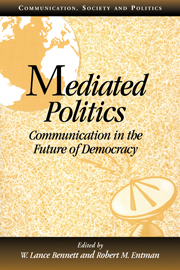Book contents
- Frontmatter
- Contents
- List of Figures
- List of Tables
- Contributors
- Preface
- Acknowledgments
- 1 Mediated Politics: An Introduction
- Part 1 Democracy and the Public Sphere
- Part 2 Citizens, Consumers, and Media in Transition
- Part 3 Mediated Political Information and Public Opinion
- 10 Reframing Public Opinion as We Have Known It
- 11 Political Waves and Democratic Discourse: Terrorism Waves During the Oslo Peace Process
- 12 Monica Lewinsky and the Mainsprings of American Politics
- 13 The Big Spin: Strategic Communication and the Transformation of Pluralist Democracy
- 14 The Impact of the New Media
- Part 4 Mediated Campaigns
- Part 5 Citizens: Present and Future
- Index
13 - The Big Spin: Strategic Communication and the Transformation of Pluralist Democracy
Published online by Cambridge University Press: 05 June 2012
- Frontmatter
- Contents
- List of Figures
- List of Tables
- Contributors
- Preface
- Acknowledgments
- 1 Mediated Politics: An Introduction
- Part 1 Democracy and the Public Sphere
- Part 2 Citizens, Consumers, and Media in Transition
- Part 3 Mediated Political Information and Public Opinion
- 10 Reframing Public Opinion as We Have Known It
- 11 Political Waves and Democratic Discourse: Terrorism Waves During the Oslo Peace Process
- 12 Monica Lewinsky and the Mainsprings of American Politics
- 13 The Big Spin: Strategic Communication and the Transformation of Pluralist Democracy
- 14 The Impact of the New Media
- Part 4 Mediated Campaigns
- Part 5 Citizens: Present and Future
- Index
Summary
Among the several competing notions of how democracy functions, pluralism – the idea that the views of citizens are effectively and equitably represented through competing organized interests – has long held special appeal. The pluralist model is often offered as the democratic ideal in cases such as the United States, where interest formations do not display the broad structural coherence of the “corporatism” common to many European nations. Our analysis applies primarily to the United States, but we draw upon important efforts to bridge the theoretical gap between pluralist and corporatist systems, including Putnam's comparative analyses of civic group life in the United States (1995) and Italy (1993), and, most importantly, Dahl's (1989) general theory of polyarchy.
Dahl defines a general continuum of polyarchy (rule by many), ranging between voter selection of officials in free and fair elections at the lower limit, and an upper limit defined as the democratic ideal of equal governance by all. This ideal is approximated by equal control of the policy agenda and equal opportunity for inclusion in policy decision processes (1989, p. 222). Like many democratic theorists before him, Dahl regards the quality and communication of political information as central to the evolution of democracy. What is relevant for our purposes is that Dahl identifies an informational dilemma common to most advanced polyarchic systems – the capture of many policy processes and decisions by policy elites whose information gives them an exclusive power (i.e., power that often excludes general publics) in complex decisions. Dahl argues that if polyarchy is to evolve beyond a state of capture by policy elites, the key lies in maximizing the free flow of information in the policy process.
- Type
- Chapter
- Information
- Mediated PoliticsCommunication in the Future of Democracy, pp. 279 - 298Publisher: Cambridge University PressPrint publication year: 2000
- 8
- Cited by



